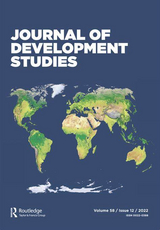
The role of political connections in COVID-19 policy response: effectiveness of firm-level government support in Egypt
El-Haddad, Amirah / Chahir ZakiExterne Publikationen (2023)
in: Journal of Development Studies 59 (8), 1213-1235
DOI: https://doi.org/10.1080/00220388.2023.2204179
Open access
The COVID-19 pandemic saw two sets of policy responses: lockdown to limit spread of the virus, which was a huge demand and supply shock, and government support to firms and individuals to offset the effects of this policy-induced shock. This paper explores the allocation and effectiveness of government support to firms in Egypt. We consider both financial support measures which were by and large already being implemented pre-COVID, as well as tax- and loan-related exemptions and deferments. After controlling for the endogeneity of government support, our main findings show that the latter has helped mitigate the effects of COVID-19, with a significantly larger, favorable impact on smaller, younger and private firms. There is no equity-effectiveness trade-off. However, although these firms apparently make better use of government support, they receive a disproportionately smaller share of it. In line with the emerging ‘unsocial’ social contract, government support has been chiefly determined by political connections and a captured industrial policy. This ‘misallocation’ reinforces the ‘missing middle’ phenomenon which acts as a constraint as SMEs are unable to grow. Nevertheless, the crisis has presented a chance for the pattern of support to slowly shift towards the more vulnerable through the more frequent use of ‘exemptions and deferments’.

